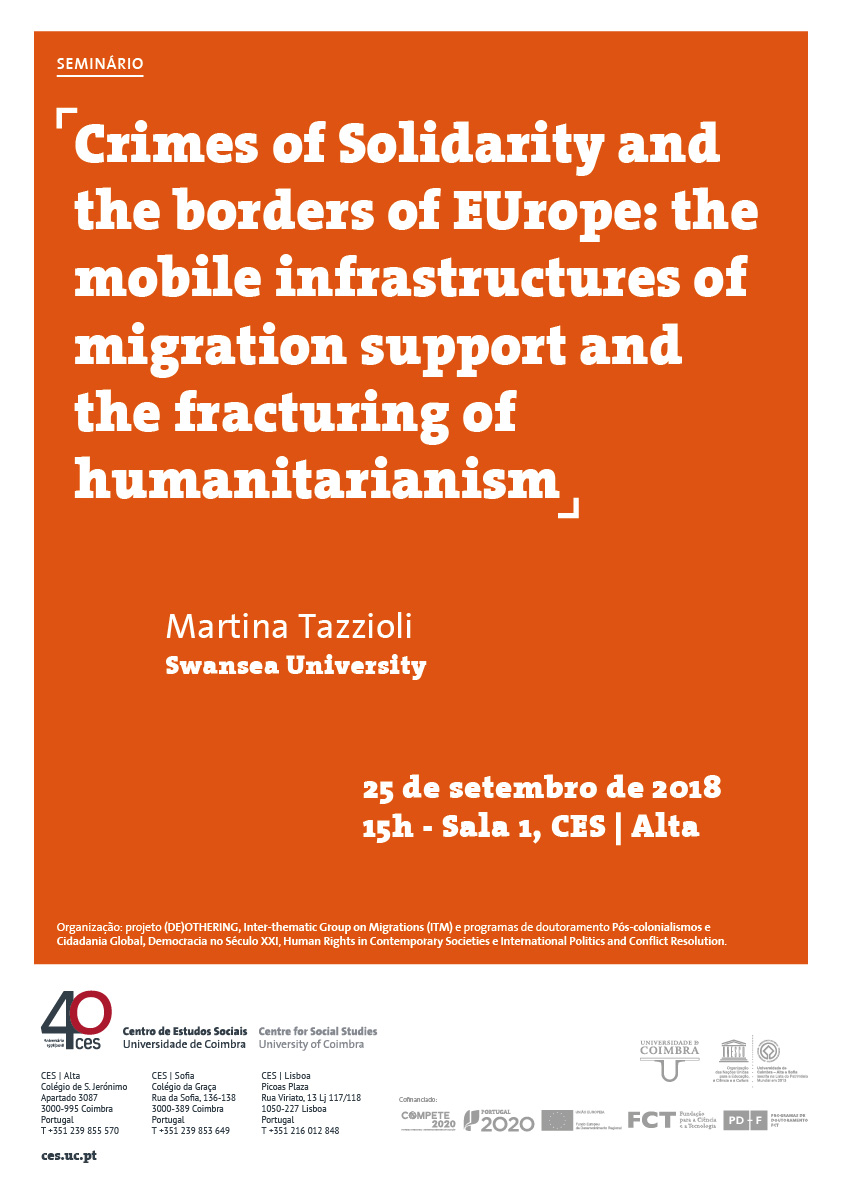Seminário
Crimes of Solidarity and the borders of Europe: the mobile infrastructures of migration support and the fracturing of humanitarianism
Martina Tazzioli (Swansea University)
25 de setembro de 2018, 15h00
Sala 1, CES | Alta
Enquadramento
In this presentation, which build from a work co-authored with William Walters, I examine the increasing criminalisation by states and the EU of citizen networks that have mobilised across Europe for supporting migrants in transit and the simultaneous increased criminalisation of refugees. Through these transnational solidarity practices a sort of infrastructure of migrant support has been built. The presentation focuses on “crimes of solidarity” which took place in France and in Italy, focusing on the French-Italian border and on the criminalisation of single individuals and groups that are helping the migrants to cross the Alps - from Bardonecchia to Briancon - or that have opened spaces to host the migrants. In this common work we argue that the criminalisation of individuals which build solidarity connections across borders paradoxically constitutes a radical challenge to Europe’s principles of citizens’ solidarity across borders. The infrastructure of migrant support enacts a form of Europeanisation of citizens’ practices that states and local authorities try instead to undermine. The presentation moves on by focusing on the ambivalences of the expression “smuggling activities” which is more and more used to name individuals who help migrants to cross or to stay without making any economic profit out of that. The presentation takes into account the frictions between local, national and European authorities in tolerating or criminalising citizens that act in solidarity with the migrants, bringing humanitarian help and building material channels for safe passages. The final part of the presentation reads the moment of crimes of solidarity in terms of a genealogy of European borders. It argues that one consequence of the criminalization of solidarity is that new hybrid forums concerning migration, citizenship and borders questions are emerging. These arise, for example, when citizens are prosecuted for acts of assistance. Their trials have potential to become public scenes and spaces of counter-politics where it is not only the citizen but Europe that is in the dock. While some have argued that criminalization and humanitarianism closes down the politics of European borders, this paper argues that it may allow for unexpected political opportunities.
Nota biográfica
Martina Tazzioli is a Lecturer in Political Geography at Swansea University. She is the author of Spaces of Governmentality: Autonomous Migration and the Arab Uprisings (2015), co-author with Glenda Garelli of Tunisia as a Revolutionized Space of Migration (2016), and co-editor of Foucault and the History of Our Present (2015) and Foucault and the Making of Subjects (2016). She is co-founder of the journal Materialifoucaultiani and part of the editorial board of Radical Philosophy Journal.
Organização: projeto (DE)OTHERING, Inter-thematic Group on Migrations (ITM) e programas de doutoramento Pós-colonialismos e Cidadania Global, Democracia no Século XXI, Human Rights in Contemporary Societies e International Politics and Conflict Resolution.


